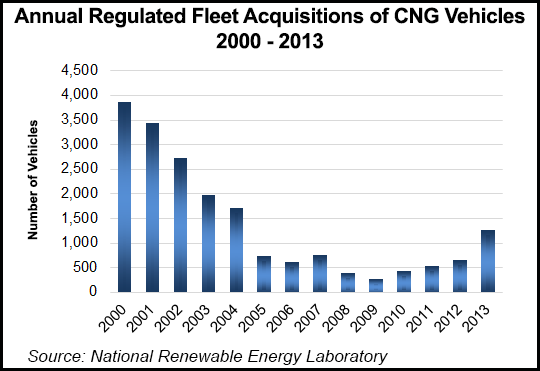Infrastructure | NGI All News Access
Innovations Pump Up NGV Fueling Sector
Two recognized names in the natural gas vehicle (NGV) fueling industry — Nebraska-based Hexagon Lincoln and California-based Clean Energy Fuels Corp. — made moves in recent days to beef up technology in compressed natural gas (CNG) and liquefied natural gas (LNG) fueling.

The Lincoln, NE-based fuel tank manufacturer last Monday said it paid $1.7 million to acquire the principal assets of the MasterWorks family businesses that include companies offering what Hexagon Lincoln called “innovative design and manufacturing solutions” for the composite industry. And on Thursday, Clean Energy unveiled a new NGV vapor barrier system for maintenance storage facilities.
Hexagon said the Maryland-based MasterWorks machining and composites businesses were already supporting its filament-winding of carbon fiber for production of its all-composite Tuffshell brand CNG fuel cylinders.
Hexagon Lincoln President Jack Schimenti said bringing the companies in-house will help complete the move to more automated processes as part of a $26 million capacity expansion in Lincoln, NE. The MasterWorks knowledge and experience also will help support Hexagon’s new joint venture with Agility Fuel Systems, which is to relocate Type IV tank and CNG cylinder assembly production.
MasterWorks and its Helman Tensioners unit specialize in providing innovative design and manufacturing solutions for the composites industry, so this acquisition enhances Hexagon Composites’ leadership and manufacturing robustness, a company spokesperson said. The transaction was effective Oct. 10 and the acquired companies will operate as MasterWorks Inc.
In California, Newport Beach-based Clean Energy introduced its NGV Easy Bay as a low-cost separation and vapor containment system for NGV operating locations. With a U.S. patent pending, Clean Energy said its system is the “first code-compliant fabric barrier system,” using an industrial curtain designed for quick and cost-effective installation and operation.
The barriers can be installed in a matter of days, a Clean Energy spokesperson said. It includes custom fabricated, scalable panels to accommodate a single bay isolation project or can be used to divide a large building into multiple bays for servicing or storing NGVs.
The new system is touted as eliminating the more costly and time-consuming requirements of conventional construction approachs. It also uses industrial fabrics that Clean Energy said have been “rigorously tested to meet American Society of Testing and Materials standards for exposure to CNG and LNG.”
Clean Energy touted the new modular system’s advantages as part of a variety of turnkey services it is providing natural gas fueling providers:
“Customers now have an unprecedented and cost-effective option available to adapt their facility for NGVs,” said Tim Newman, Clean Energy general manager of the company’s facility modification group. “As fleets across the country convert their vehicles to natural gas, a growing need has emerged for a scalable and practical solution to modify facilities.”
Elsewhere, Volvo broke into the U.S. CNG bus market with an $11 million deal to provide 20 of its LFS natural gas buses to Niagara Frontier Transportation Authority. And Volvo’s Nova Bus unit has options to provide up to 166 more buses to Niagara during the next five years.
The New State-based transit provider is getting Nova Bus LFS vehicles with 8.9 liter ISL G Cummins Westport engines and Type II CNG roof-mounted tanks. This deal is Nova Bus’s first big sale in the United States.
The buses will be assembled in New York state where Nova Bus has a plant in Plattsburgh, near the Canadian border. A network of more than 350 component suppliers in the United States will be used by Nova Bus, according to its parent company, Volvo Group.
© 2024 Natural Gas Intelligence. All rights reserved.
ISSN © 1532-1231 | ISSN © 2577-9877 |
